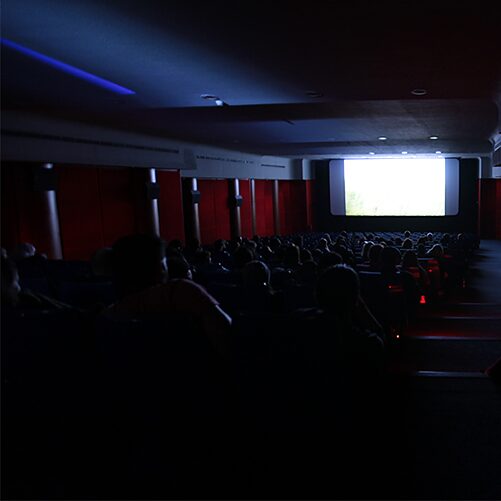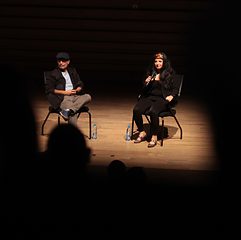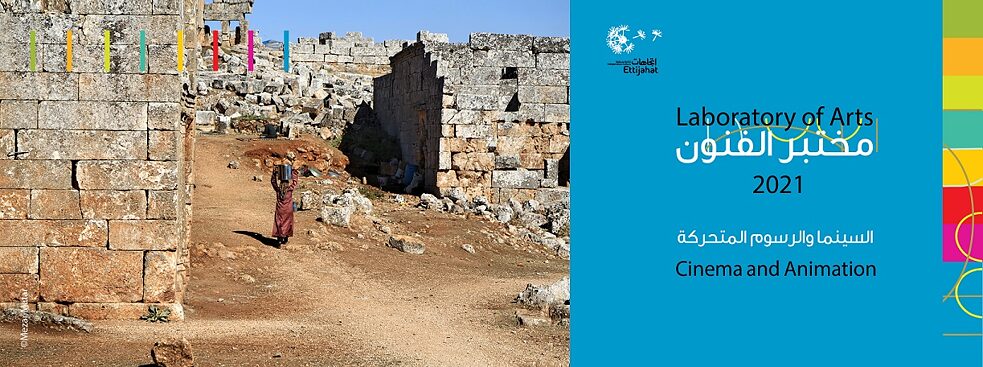Amal Mohamad Shehab | A Bird, a Shoe, and a DShK Bullet
The movie is a long documentary accompanying artist Nassouh Zaghloula on his return to Syria and following the loss of his birds, for whom he had built nests during the past few years of the war. The loss inspired Zaghloula to create art. The movie looks into the meaning of home, loss, and the elements that bind us to the place, through the symbolism underlying Zaghloula's relationship with his birds and the tragic fate it has suffered.
Qusay Baz | Absence Blooms
A short feature film addressing human relationships in the modern city, by examining the profiles of three characters living in the same city: a security guard obsessed with hygiene, a woman dreaming of her lover, and a migrant freelance musician. The only link between the three characters is that they each met a girl beggar living in the streets of the city, whether directly or indirectly.
Raed Zeno | Refugees in the Ground
A long documentary shedding light on a set of true stories which document the suffering that follows the death of a refugee, and the difficulty of finding a grave. The movie follows the deceased's relatives as they struggle to find a burial spot or to transfer his body to a different country. The stories carry a host of paradoxes and images involving a lot of emotions and questions.
Samer Salameh Abu Qatmeh | Dark Note
A feature film based on author Fajr Yaacoub’s “Dark Note”. The movie follows the protagonist Mehyar, a Syrian young man fascinated by theatre and cinema. Mehyar takes the train from a remote station in France, only to find himself in a bizarre place where people and events overlap between reality and imagination. These events have commonalities with English author Agatha Christie’s accounts on her experience writing the novel Murder on the Orient Express, which she wrote while staying in Aleppo, Syria.
Ghiath Al-Mhitawi | Return
A short feature film set in Damascus in the spring of 2013 which tells the story of a Syrian Army soldier who returns to his family’s home on a 24-hour leave. The soldier, Hussam, tries to share his cloudy thoughts about running away from his military service with his mother, as he cannot put them into action without the support of his family. However, his mother, who is pro-regime, stops his attempts and tries to awaken his resolve with words of patriotism and heroism. When the soldier sees his things arranged in the attic next to his dead father’s belongings, he realises that he has been forgotten even by his own family, and feels even more trapped.
Madonna Adib | Four Bras and No Veil
A documentary that addresses the subject of the body and freedom. The director spends her time in the Lebanese city of Tripoli with four young females from the Syrian city of Hama, studying the repercussions of their separation from their families and their removal of their veils. The story plays out in parallel with the director’s own journey of taking off her veil and separating socially and religiously from her native Damascus society in order to live according to her sexual preferences. What are the repercussions for women who go against everything that has been pre- written for them? How do they live with their fear and internal battles and embark on new paths that they have never travelled before?
Souha Hassan | Choice?!
A long documentary set in the city of Damascus, centring around four characters, three of whom are affected by the Syrian reality and have chosen to remain in Syria. The fourth character, which is represented by a dancing shadow, narrates a reality in which many young people are forced to stay in the country. The film discusses, through its characters, the concepts of travelling/staying, choice/compulsion, hope/despair, fighting/fleeing, and life/death. It shows the hopeless shadow between the decision to stay and the desire to leave or disappear as it travels through the streets of a worn-out city inhabited by characters who have overcome, endured and maybe adapted to this hopelessness.
Reham Kassar | Until
A film documenting the life of Reham, a Syrian student studying at Berlin University of the Arts. When she is forced out of her room because she could not pay the rent, Reham marches on a journey to find a place to live. She moves from place to place and meets different people. Her circumstances become harder as the money she has diminishes and those close to her are unable to help. With every new place she visits and every character she meets, she discovers a part of herself she never knew before.
Warsheh Group | Birth in a Coffin
A feature-length documentary film that tells the story of a father who turns a pickup truck that he uses for selling gas cylinders into a radio station which tours Binnish neighborhoods with his child. The father replaces the revolution flag with the al-Qaeda flag. The camera monitors changes in the community as it transitions from demanding freedom and a civilian state with all its inscribed slogans into extremism after the domination of al-Qaeda and ISIS. We are ultimately introduced to the city over three years of family life and changes.
Yanal Mansour | Captain Maher
A feature-length documentary film about Captain Maher, a firefighter who, through a personal voluntary initiative, enters public schools to lecture on what he calls "public safety", where students are taught a range of ways to survive potential mistakes due to war or environmental disasters. The film also highlights the structure and functioning of the educational system in Syrian schools.
Amer Matar | Plastic Flowers
Plastic Flower is a documentary about an ongoing search for a journalist kidnapped by ISIS since August 2013. His family tries to know his fate, while dealing with his enforced disappearance. They use a set of cameras during their search to share the stories they witness in the Syrian city of Raqqa and inside the ISIS prisons there. The cameras also capture the family’s escape - first to Turkey and then to Germany, and their subsequent search in Raqqa after ISIS lost control of the city.
Mohamed Aref Haj Youssef |
Al-Maari's Head
"Al-Maari's Head" is a documentary film about the journey of Syrian visual artist Assem Al-Basha, as he sculpts the head of famous Islamic philosopher, poet, and writer Abu Al-Alaa’ Al-Maari for the second time, after he had previously created the artwork in the early eighties as a gift to a doctor who treated a member of his family. The film also documents the artistic and personal journey of Basha who lost his artworks in Syria after he buried them, who witnessed the killing of his brother under torture, and who experienced exile from his home country, which he might never see again.
Nadim Suliman | Family at War
"Family at War" is documentary about the life of a young Syrian expatriate who falls in love with an older Polish lady and plans to marry her. He is faced with his family's rejection of their relationship and is forced to return to Syria to confront his relatives, only to discover that they are still living in the shadows of old family feuds. The young man makes choices similar to those made by his father and grandfather in the past, which had initially led to the existing family conflicts.
The young man has to choose between either being with the woman he loves or refraining from doing so as to avoid an escalation of the family feuds that run in parallel to the raging war in his country.
Zeina Qahwaji | Crystal House
"Crystal House" is a feature length documentary that records the diaries of an elderly couple throughout Syria’s seven years of uprising and conflict. It serves as an observation of the diaries of this couple who is deeply rooted in the place they live and who try to carry on with their daily routine despite the great challenges that are unfolding at their doorstep.
Ibraheem Ramadan | Double Vision
Double Vision is a mixed documentary depicting the 1974 car racing (Rally) between Syria and Lebanon on a track that was later closed due to the Lebanese civil war. The film uses different kinds of media, including rare footage of the rally, stop-motion animation as well as material filmed between 2008 and 2011 by the director on a road parallel to the original track. At the end of the film, the two roads converge at the northern region of Afrin in Syria, where also the two timelines overlap: that of the race and the director’s more recent footage. Everything on the road - the army, war participants, and diner shack owners - joins the car racing teams.
Issa Khoder | Where Is My Friend?
This short documentary narrates the story of Issa Khoder's journey back to an ISIS prison in Syria, where he was detained for three years in the Aleppo countryside. Khoder hopes to find his friend with whom he spent six months in a crowded cell.
Lina Alabed | Ibraheem
A documentary film about the director's journey to reconcile with her family history and affiliations, as she grabbles to understand her father's choices and how they influence the choices taken by her family today.
Her father, Ibrahim al-Abed, was a secret member of the Palestinian Revolutionary Council. In 1987, he left on a regular mission but never came back. Since the age of six, she grew up in a home ruled by silence as her mother Najat decides to raise her five children in Damascus.
Wael Kadlo | Road to Home
A documentary film through which the director seeks to analyze conflict – be it family feuds or civil wars - and how we turn ourselves into tools of punishment to take revenge against one another. The film is a family journey in search of courage needed to face a difficult reality and trying to discover possible ways towards reconciliation away from "destruction."
Eyas Almokdad | The Last Scene
The Last Scene is a documentary showing the beginnings of the Syrian revolution. In this film, the director goes back to the earliest videos filmed by his younger brother, Orwa, that illustrate the noble beginnings of a civil uprising. The film delves into how the uprising turned into defeat, which is historically suffered by those calling for freedom, and how these earlier videos of the Syrian revolution turned into tombstones for its participants. Eyas searches for his little brother’s face only to find it changed and hardened by the challeneges that shaped a heroic protagonist in a film yet to have a final scene.
Morhaf Youssef | Crowns
Crowns is a 2D animated short film that hihgly depends on visuals and music to tell its story. The film follows two neighbouring fictional kingdoms that come into being from nowhere. Soldiers of both kingdoms die in endless wars fuelled by their kings’ desire to control everything. After exhausting their armies, the two kings, themselves, fight. A new anonymous king appears out of nowhere and defeats both kings, asserting his presence as we see his new red carpet rolled over the old, torn ones.
Salam Alhasan | Snow of Damascus
Snow of Damascus is an animation film depicting two parties as they fight in the Marjah Square in Damasucs in the heart of the Syrian capital. For a moment, both sides are on equal footing and the fighting stops. The two opponents approach the centre of the square cautiously. Snow starts falling, erasing the marks of battle as a new image forms: it’s something no one saw coming.
Maya Mounayer | Home of the Rivers
Salam al-Zuheiry is a former Iraqi sculptor. According to Zuheiry, he turned to the Sabian faith as a way to cope with the pain of losing sight of his identity. Since 2004, Zuheiry has lived with his family in Damascus as a refugee, despite it now being the capital of a country witnessing the largest immigrations of the century. His life in Damascus inspired him to go back to sculpture after a 13-year hiatus.
In an attempt to overcome his sculpture/religious dichotomy, Noura (Zuheiry’s daughter) and his Syrian friend, Fadi Yaziji, encourage Zuheiry to create "The Scream," which represents his objection to the fragmentation of humans and humanity.
The film takes place in Jaramana where the Zuheirys reside. Through them, questions about identity and forced displacement come to the fore as they try to live and assimilate in a war-torn country. The film opens with the legend of the Mesopotamian flood and showcases what life could be after total destruction.
Mezar Al Matar | The Punctured Ceiling of Memory
The Punctured Ceiling of Memory is a film project about Serjila, one of the dead cities in the Idlib province that had been abandoned by its residents over 1300 years ago. The village suddenly comes back to life as new residents take shelter there from the destruction surrounding them, becoming phantom-like dwellers in homes untouched for hundreds of years ago.
The film follows the lives of three families who arrive at the village to build new homes, depicting their relationship with the place and its changing features. It is also an account of the new residents’ daily life, forced to go back 1300 years in time, their lives are ruined by war and they are unknowingly destroying a historical site. Their lives intertwine with the myths of the village’s ancient residents, who are spoken of as the ghosts of a deserted place.
Orwa Almokdad | 300 Miles
The director tries to shed light on the physical and metaphorical distances created by the war in Syria since 2011 via the lens of his niece, Nour, and his own. From north Syria to its south, one of the root causes of this separation in the Levant region was the establishement of Israel in 1948. Nour and her uncle live 300 miles apart, both in the geographical and metaphorical sense. Mokdad tries to find answers to his questions and those of his niece about what is taking place in Syria via his character, Adnan, who is a philosophy student and an activist, and Abi Yaareb, the leader of the Free Syrian Army. The film won the best long feature film award at the Doclisboa International Film Festival.
Rousl Goup | Douma I Love U
The project is based on group work of civilian activists with artistic interests. It enables them to produce artistic projects in the form of short film clips, which revolve around the theme of “the city” and “everyday life,” within the same framework as the many internationally recognized “… I Love U” films/series.
The project also aims to provide a film that would defy the passage of time, away from how the media depicts current events. It provides a unique perspective into the reality of the Douma city life - away from the media and the topics of being weary, the suffering and the fear, which people have endured for four years since the beginning of the revolution.
The project also seeks to focus on three aspects of life: firstly, the culture of life and love that are both present in spite of the harsh conditions and suffering civilans experience on a daily basis; secondly, their steadfastness in the face of fear; and finally, their surrender. This film is a civilian/artistic expression.






















